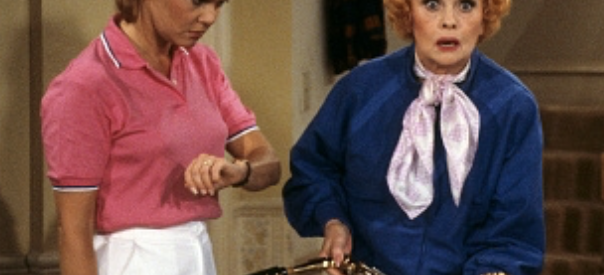But At Least Lucille Ball?s Final Return To Weekly TV Was A Noble Attempt
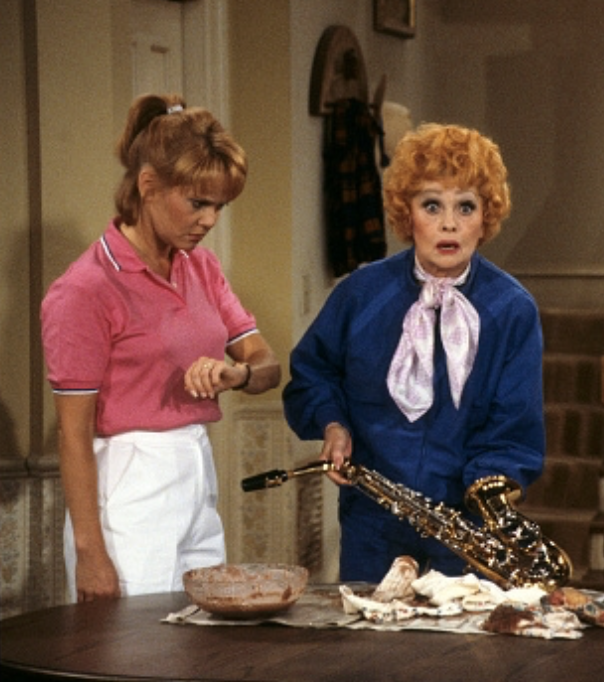 Lucille Ball, gave it the old-school college try with new co-star Ann Dusenberry, among others, in ?Life With Lucy?
Lucille Ball, gave it the old-school college try with new co-star Ann Dusenberry, among others, in ?Life With Lucy?
On Saturday night, September 20th, 1986, the legendary Lucille Ball partnered with producers Aaron Spelling [Charlie?s Angels] and Douglas S. Cramer (Wonder Woman) and brought back to the small-screen a sitcom that chronicled the updated adventures of Ball?s iconic Lucy persona.
This time, the actress played grandmother Lucille Barker, who resided in Pasadena, California, with her daughter, son-in-law, two grandchildren, and in-law grand-father/hardware-store-business-partner Curtis McGibbons, played by Gale Gordon.
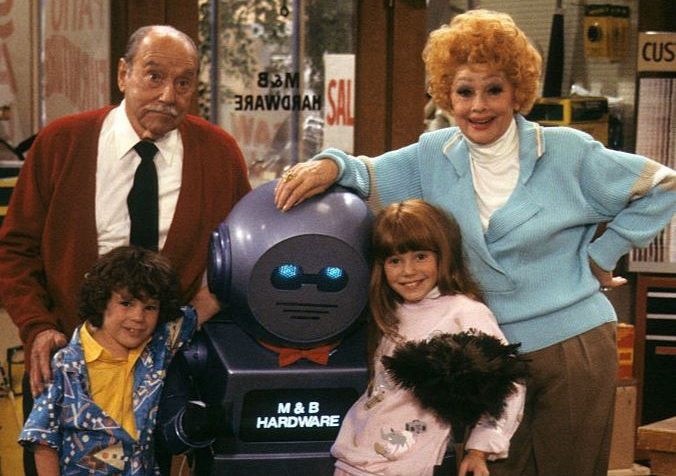 Gale Gordon, with Ball and the young co-stars of ?Life?: Philip J. Amelio II and Jenny Lewis
Gale Gordon, with Ball and the young co-stars of ?Life?: Philip J. Amelio II and Jenny Lewis
As Lucy fans around the globe know so well, Gordon had appeared with Ball on each of the earlier Lucy incarnations in one capacity or the other. On I Love Lucy (CBS, 1951?57), in which Ball co-starred with husband Desi Arnaz, she had originally cast Gordon as neighbor Fred Mertz. But the actor was unavailable for the role that ultimately went to William Frawley (who later appeared on CBS? My Three Sons with Fred McMurray). Gordon, however, did at least have the chance to guest-star on Love and its later expanded edition, The Lucy-Desi Comedy Hour (CBS, 1957?60).
But after Ball and Arnaz divorced, and the Hour was no more, the comedic actress returned to TV with The Lucy Show, (CBS, 1962?68), and this time Gordon was available on a regular basis, and was cast as the banker Mr. Mooney to Ball?s Mrs. Carmichael. A few years later, Ball reworked her TV presence once more and played Lucy Carter on Here?s Lucy (CBS, 1968?74) with Gordon portraying brother-in-law Harrison Carter.
Some 12 years after Here?s Lucy left CBS, Life With Lucy arrived on ABC.
In between those years, Ball guest-starred on variety programs like The Dean Martin Show, and The Bob Hope Specials, and made a few of her own specials for CBS, some of which had dramatic elements. She then dramatically exited the ?Tiffany? network for a short affair with NBC.
Yet it was with ABC?s Life With Lucy that the actress returned to her beloved red-headed roots on a weekly basis.
In addition to Gordon?s return to her side on Life (as the staple second banana ? a position he embraced and revered), Ball hired long-time Lucy scribes Madelyn Pugh Davis and Bob Carroll, Jr., while second husband Gary Morton (a former stand-up comic) joined Spelling and Cramer as Life?s co-producers.
The Time For ?Life? Seemed Right
Lucille Ball had recently appeared in a highly-rated TV-movie for CBS, titled Stone Pillow, in which she played a homeless woman. Her performance was heralded by critics and Lucy fans alike, and everyone deemed it a period for Ball to come back to weekly TV.
Consequently, Life With Lucy was born.
Unfortunately, it then died a very quick and painful death.
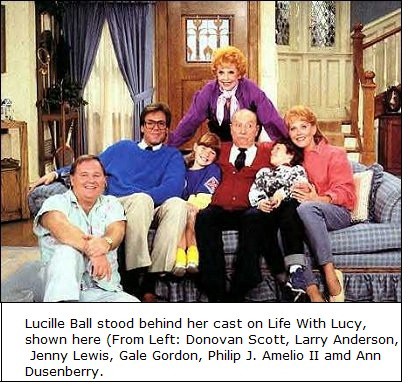
Thirteen episodes were produced, but only seven were aired. The first, ?One Good Grandparent Deserves Another,? cleared the Top Twenty in the ratings, but the critics were brutal. In subsequent weeks, the audience dwindled.
The overt negative reactions from fans and critics alike devastated Ball, so much so, she later appeared on The Joan Rivers Show, and wept.
There were attacks from critics and fans about the writing. The show was called archaic and out of step with the times. What?s more, Ball was now in her late seventies, and years of smoking and not properly catering to her health (an ironic twist, as her Lucy Barker character from Life was defined as health-conscious) had taken its toll.
Just Not The Same
Lucille Ball was no longer young, and her brand of slapstick comedy had out-worn its welcome, a tad shy of Nick at Nite?s retro TV resurgence (which commenced a mere one year before in 1985, with an all-new network dedicated to all old shows).
Life With Lucy was rejected, and the real-life Lucy took it personally. She felt unloved, by fans, critics, and colleagues. She was overcome by the insecurities possessed by many performers, particularly, comedic performers. Her skin was not thick enough; her mind-set could not bear the unyielding attacks, of which she simply was not prepared.
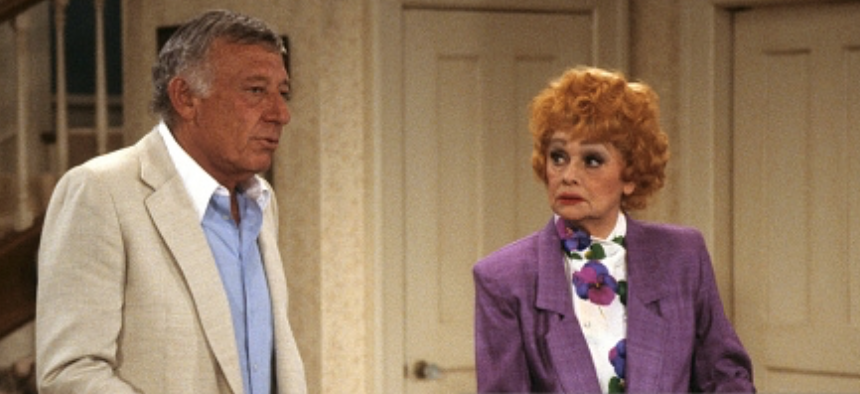 Ball?s second husband, former comedian Gary Morton, served as an executive producer on ?Life with Lucy?
Ball?s second husband, former comedian Gary Morton, served as an executive producer on ?Life with Lucy?
As a result, the once enthusiastically-promoted Life With Lucy was no more ? and in time, so would be the case with Lucille Ball herself. In 1989, at age 77, she died of heart troubles or a troubled heart?in the form of a ruptured aorta. Ironically, this was the same disorder that, in 2003, would kill John Ritter, who Lucy had adored for years as the star of Three?s Company (and who guest-starred on Life?s second aired-episode, Lucy Makes A Hit With John Ritter).
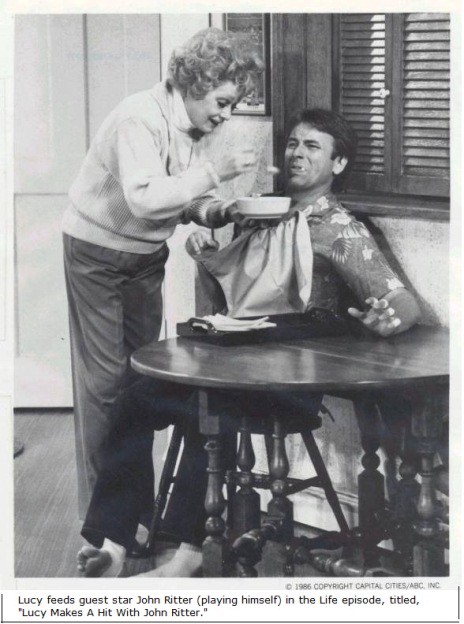
Unfathomable
However one decides to word it, Lucille Ball had been fired, and that was simply something that the esteemed actress had never experienced. It was a development that ultimately proved too much for her to take. A glowing small screen image that was introduced to the world with I Love Lucy, and that classic shows iconic big-heart in its logo, had now died of a broken heart (again ? however one decides to word it). Ball?s adoring personal and public fans were nowhere in sight. Seemingly, they had deserted her and dwindled away some thirty years after the world fell in love with Lucy.
After Ball?s demise, millions of her fans then came out of the woodwork and mourned. Lines reaching around the block surrounded the hospital in which she was attended during her final days.
Had Life With Lucy been given a fair shake, the story may have ended differently.
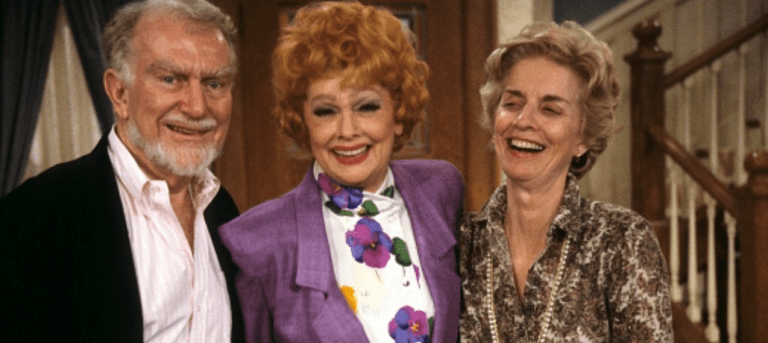 Not even ?Lucy? TV writing vets Bob Carroll and Madelyn Pugh Davis could save ?Life?
Not even ?Lucy? TV writing vets Bob Carroll and Madelyn Pugh Davis could save ?Life?
Life With Lucy had its issues, but any new television show needs time to find its pacing and place. Life was no different. Its development required patience ? from all of those involved with its production, and from Lucy?s fans. Had it been granted at least one season, or maybe two, Life would have found its rhythm. The episodes were sweet and in many instances superior to a few segments that were presented on Here?s Lucy.
The Life character of Lucy Barker had infinite more texture than both Lucy Carter on Here?s Lucy and Lucy Carmichael on The Lucy Show. Lucy?s Carter character had legitimate emotions and interactions that were displayed realistically for a TV character in her age bracket (particularly in the era of The Golden Girls, which aired Saturday nights on NBC, one hour after Life).
Lucy Barker interacted with her fellow TV characters in charming ways. Yes, the comedy was somewhat broad, and maybe a little out of date (as well as slightly jarring for viewers who were somewhat aghast to see the aged actress performing so physically for her age). But the show had promise, and it deserved an opportunity to shine.
Things Were Looking Up?But Then?
Upon viewing each subsequent episode of Life With Lucy, it became clear the show was improving, and that Lucille was having a ball. She allowed her co-stars their comedic on-screen moments and seemed to delight in their performances in a combined reaction as both Lucy Barker and Lucille Ball.
With a career that spanned decades, Lucille Ball, the actress, could deliver a line of dialogue and dance with the best of them (and she did). Although she could only slightly carry a tune (by her own admission), the spectacular thespian was able to pull off any vocal performance with a charismatic appeal. As one of the most outstanding entertainers in the history of the industry, she contributed a great deal to so many in countless ways for ages.
In short, Lucille Ball in her later years deserved more than the heartless attacks and abandonment that she received by way of Life With Lucy.
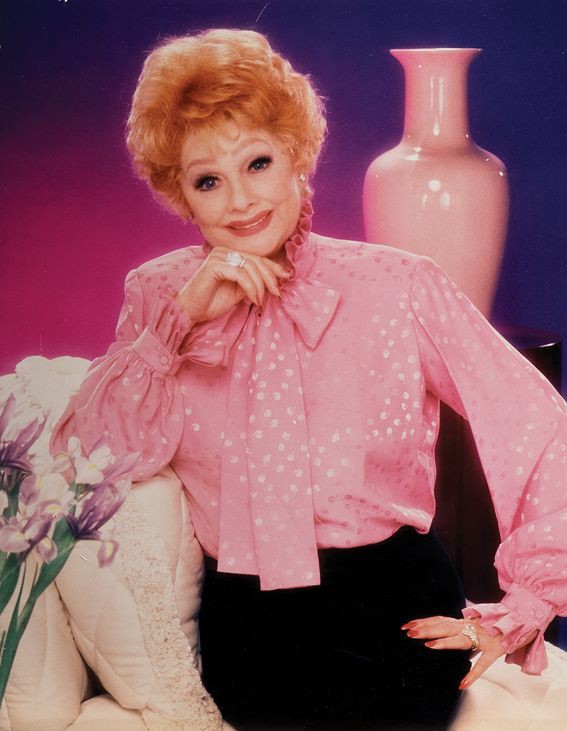 Ball looking stunning in a promo still for ?Life With Lucy?
Ball looking stunning in a promo still for ?Life With Lucy?
